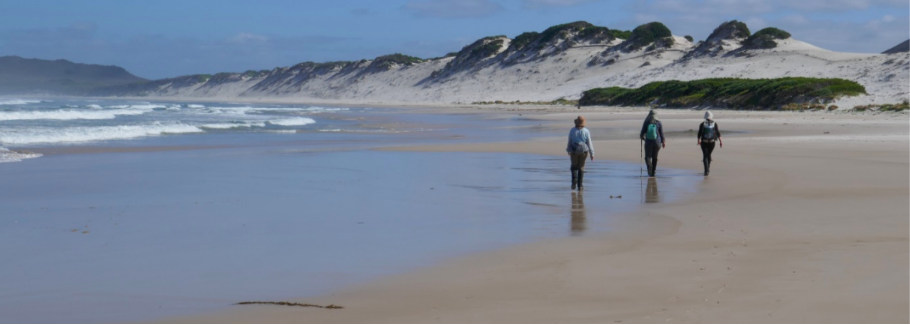Volunteers have an impact on coastal weeds in Tasmania’s Wilderness World Heritage Area
The Wildcare group, Sea sPurge Remote Area TeamS (SPRATS) (featured in an article on March 27), recently completed a report which outlines the key achievements of their work over the past 17 years. It makes for some impressive reading and begins with the following outline of their objectives:
SPRATS are a self-managing volunteer group working in partnership with the Parks and Wildlife Service (PWS). For the last 17 years (test season followed by 16 years of SPRATS weeding) the group has been controlling and then working towards eradicating the ecosystem-transforming weeds sea spurge (Euphorbia paralias), marram grass (Ammophila arenaria) and blackberry (Rubus fruticosus aggregate). The group works in coastal parts of the Tasmanian Wilderness World Heritage Area (TWWHA) and its adjacent buffer areas on Tasmania’s west and south coasts between Macquarie Harbour and Cockle Creek.
This region is one of the most important areas in Australia for conservation. Other than the target weeds, the region has a low weed incidence and is a major stronghold for a number of shore-nesting and feeding birds, including the hooded plover, pied oystercatcher and sooty oystercatcher along with the orange-bellied parrot during its migration.
These bird species are at risk due to sea spurge and marram grass’ ability to transform the coastline’s geomorphic structure, making it less suitable for breeding and feeding.
SPRATS operates according to the detailed aims and objectives of a ten year plan. SPRATS achieved the original objectives of the initial plan covering the period 2007/08 to 2016/17, and is now working to meet the targets of a subsequent ten year plan covering the period 2017/18 to 2026/27. The current plan details the work performed to date, along with the objectives, methodologies and strategies used for weed control.
A feature of SPRATS’ work program is collection of geo-referenced data on all weeds removed, along with targeted research into the most effective treatment methods.
This data is used to demonstrate work effectiveness, plan work programs and report progress to the PWS and other funding bodies. At the start of each weeding season, detailed paper maps are prepared showing weeding sites, campsites and walking routes. This data is also downloaded into GPS units to enable groups to efficiently locate previously identified weed sites, campsites and walking routes and to record new ones.
SPRATS’ results have been recognised by:
- Highly commended, CoastCare Award, 2021 Tasmanian LandCare Awards;
- Finalist in the 2017 Tasmanian Community Achievement Awards;
- Winner – 2016 Invasive Species Council’s Froggatt Award for control and eradication;
- Selection as a case study showing the effective use of volunteers for environmental work;
- Winner – the community group category of the 2009 Tasmanian Environmental awards;
- Finalist in the 2009 and 2010 Banksia Environmental awards – community group category.
SPRATS have also been at the forefront of the development of the concept of adventure volunteering, which is the linking of effective and highly targeted environmental work with high value recreational activities.
In the past two seasons, SPRATS has played a leading role in the Tasmanian component of the testing and spreading of the recently developed CSIRO sea spurge biocontrol. The biocontrol has the potential to provide a long term solution for broad-scale sea spurge reduction, particularly for heavily infested areas, such as those north of Macquarie Harbour. In addition to weed removal, SPRATS crews also collect information on other conservation values, including shore bird types and numbers, Tasmanian devil sightings, condition of cultural heritage sites, impacts of human activities, and location and density of whale strandings. For example, following the October 2022 Ocean Beach pilot whale stranding, SPRATS crews were asked to record numbers and locations of pilot whales washed onshore, and recorded a total of 82 whales across 5 sections of coastline.
Read the full report here.
To continue the effective management of sea-spurge and marram grass across this remote coastline, the SPRATS Branch is always on the lookout for volunteers with remote-area bushwalking skills who are able to operate safely and productively in these sometimes challenging environments.
If this is of interest to you, please contact: sprats.tas@gmail.com
Jon Marsden-Smedley
